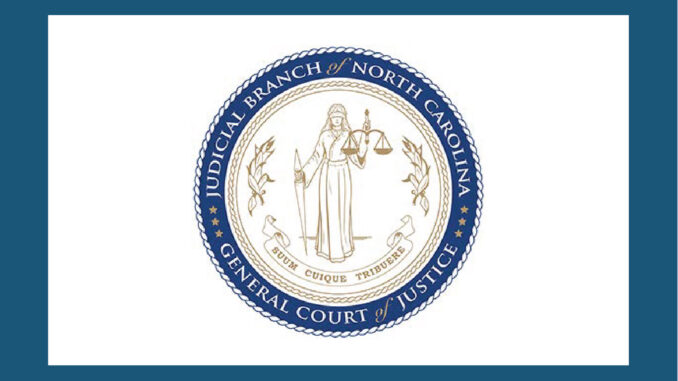
CARTHAGE — Local courts face significant backlogs in pending cases, so district attorneys are getting creative.
For the third year in a row, Moore County District Attorney Mike Hardin worked with the District Court to tackle 73 DWI cases that had been pending for more than a year. The special weeklong court session, running from Nov. 27 to Dec. 1, 2023, saw two courtrooms running full-tilt to bring 38 cases to a conclusion, with DA Hardin’s team racking up an 89 percent conviction rate.
The session, focusing on cases from November 2022 and earlier, was part of a broader effort across North Carolina to reduce judicial delays, a situation that had worsened during the COVID-19 pandemic. Additional prosecutors from the North Carolina Conference of District Attorneys were brought in to help manage the cases.
This initiative is an example of the efforts made by judicial districts across the state to address the enormous backlog that peaked at 1.2 million cases during the pandemic. As of August 2023, this number has been reduced to 900,000, marking a 25% reduction statewide.
Of the 38 cases brought for bench trials in front of district court judges, two were dismissed outright — one after a defense motion to suppress was granted and the other because the defendant had a .04 blood alcohol content, below the legal limit in North Carolina. In two other cases, the judge found the defendant not guilty. One case was a felony charge because of prior DWI convictions and was elevated to Superior Court for trial.
In an interview with North State Journal, Hardin explained the scheduling challenges in a county like Moore.
“DWIs take a while to try. District Court is only three days a week, and there are traffic offenses, speeding tickets, and those sorts of things,” Hardin said. “Three days a week and not even every week. At an hour or two per case, we can’t dispose of them if we take every case to trial.”
Old cases are a challenge for law enforcement, too. A North Carolina State Trooper who transferred to the western part of the state months ago was able to finish his last few cases last week — all helpfully scheduled on the same day.
“It’s one of the more serious things that happens at District Court,” Hardin said. “People get a lawyer, and then the lawyer does all the things that a lawyer wants to do,” which results in a necessarily longer proceeding than something simple like a speeding ticket.
“I would like to thank the Moore County Clerk’s Office, the North Carolina Highway Patrol, the Moore County Sheriff’s Office Bailiff Staff, and the many different law enforcement agencies that worked with my office to make this week a success,” said Hardin in a press release. “I would also like to thank the Conference of District Attorneys for providing their assistance and providing staff to assist my office.”
New Hanover County implemented a similar strategy to tackle its backlog of DWI cases. District Attorney Ben David set up a backlog court that focused on over 70 cases awaiting trial for more than a year. This approach, necessitated by the complexities of poly-impairment cases involving substances other than alcohol, required specialized testing and expert witness coordination.
The success in Moore County, New Hanover, and others is reflective of a statewide initiative to combat the scheduling challenges faced during the pandemic. The AOC has highlighted numerous strategies employed across the state, such as holding court off-site, employing advanced technology, and streamlining case management processes.
Chief District Court Judge Scott Ussery moved some special sessions outside the courthouse to tackle the backlogs in Bladen, Brunswick, and Columbus counties. “We got approval to go off-site, and we went five miles down the road and found a gymnasium, cafeteria, and media center, and for 11 months, we held court,” said Judge Ussery on an Administrative Office of the Courts (AOC) podcast. “We did everything we could as the stakeholders in our community to make sure the system didn’t stop.”
Hardin said remaining untried cases, delayed for a variety of reasons such as unavailable defendants, defense attorneys, or law enforcement, should be resolved over the next few months.
A first misdemeanor DWI conviction typically results in probation, community service, and a fine.
